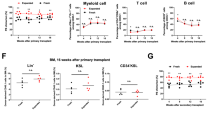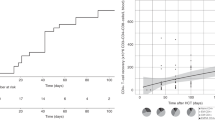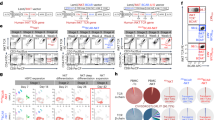Abstract
Little is known about the cell types or mechanisms that underlie the engraftment process. Here, we have examined parameters affecting the engraftment of purified human Lin−CD34+CD38− normal and AML cells transplanted at limiting doses into NOD/SCID recipients. Mice transplanted with 500 to 1000 Lin−CD34+CD38− cord blood (CB) or AML cells required the co-transplantation of accessory cells (ACs) or short-term in vivo cytokine treatment for engraftment, whereas transplantation of higher doses (>5000 Lin−CD34+CD38− cells) did not show these requirements suggesting that ACs are effective for both normal and leukemic stem cell engraftment in this model. Mature Lin+CD34− and primitive Lin−CD34+CD38+ cells were capable of acting as ACs even though no repopulating cells are present. Cytokine treatment of NOD/SCID mice could partially replace the requirement for co-transplantation of AC. Furthermore, no difference was seen between the percentage of engrafted mice treated with cytokines for only the first 10 days after transplant compared to those receiving cytokines for the entire time of repopulation. Surprisingly, no engraftment was detected in mice when cytokine treatment was delayed until 10 days post- transplant. Together, these studies suggest that the engraftment process requires pluripotent stem cells plus accessory cells or cytokine treatment which act early after transplantation. The NOD/SCID xenotransplant system provides the means to further clarify the processes underlying human stem cell engraftment.
This is a preview of subscription content, access via your institution
Access options
Subscribe to this journal
Receive 12 print issues and online access
$259.00 per year
only $21.58 per issue
Buy this article
- Purchase on SpringerLink
- Instant access to full article PDF
Prices may be subject to local taxes which are calculated during checkout
Similar content being viewed by others
Author information
Authors and Affiliations
Rights and permissions
About this article
Cite this article
Bonnet, D., Bhatia, M., Wang, J. et al. Cytokine treatment or accessory cells are required to initiate engraftment of purified primitive human hematopoietic cells transplanted at limiting doses into NOD/SCID mice. Bone Marrow Transplant 23, 203–209 (1999). https://doi.org/10.1038/sj.bmt.1701564
Received:
Accepted:
Published:
Issue Date:
DOI: https://doi.org/10.1038/sj.bmt.1701564
Keywords
This article is cited by
-
Auger electrons for cancer therapy – a review
EJNMMI Radiopharmacy and Chemistry (2019)
-
Establishment of reproducible xenotransplantation model of T cell acute lymphoblastic leukemia in NOD/SCID mice
Journal of Huazhong University of Science and Technology [Medical Sciences] (2012)
-
Animal models of acute myelogenous leukaemia – development, application and future perspectives
Leukemia (2005)
-
NOD/SCID mice engineered to express human IL-3, GM-CSF and Steel factor constitutively mobilize engrafted human progenitors and compromise human stem cell regeneration
Leukemia (2004)
-
Identification of hematopoietic stem/progenitor cells: strength and drawbacks of functional assays
Oncogene (2004)



